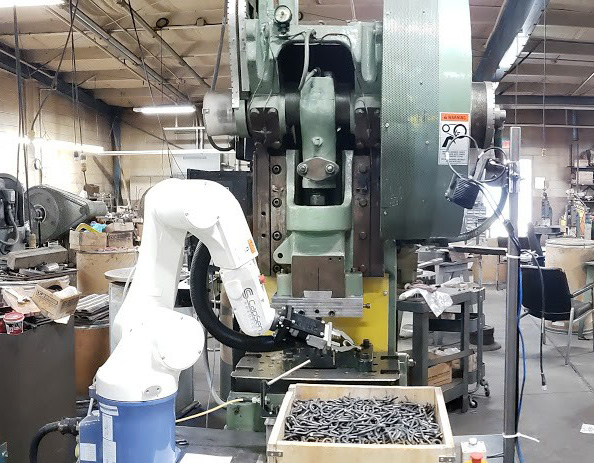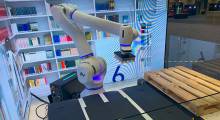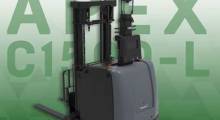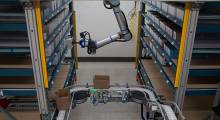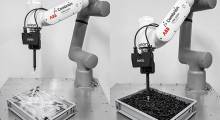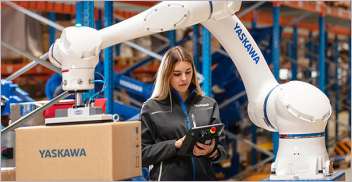The Advanced Robotics for Manufacturing, or ARM Institute today announced that Dr. Jared Glover, CEO of CapSen Robotics, has been selected as the institute’s first fellow. As an ARM Institute Fellow, Glover will execute a technical project to address key challenges hindering the adoption of robotics in manufacturing.
The new fellowship program supports the Artificial Intelligence in Metals and Manufacturing (AIM) Higher Consortium. That group is led by the Catalyst Connection and is intended to help small and midsize manufacturers that supply or are pursuing opportunities with the U.S. Department of Defense (DoD).
First ARM Institute Fellow
Glover is co-founder and CEO and of CapSen Robotics, which makes software to give robots more spatial intelligence. He received his Ph.D. in computer science in 2014 from MIT, where he developed and applied new theoretical tools for processing 3D orientation information to applications in computer vision and robot manipulation.

Prior to that, Glover completed his B.S. in computer science from Carnegie Mellon University, where he led a team developing robotic walkers. He has 20 years of research experience in robotics and computer vision and more than 500 paper citations.
Glover is also on the boards of the Pittsburgh Robotics Network and the Catalyst Connection, a private non-profit that provides consulting and training services to small manufacturers in southwestern Pennsylvania.
During his ARM Institute fellowship, Glover will work on the “Autonomous Robot Workspace Modeling with an Arm-Mounted 3D Camera” project. It aims to help small and medium-sized manufacturers (SMMs) adopt robotic technologies by lowering the cost and time of robot integration and making it easier for users to deploy robots in high-mix, low-volume applications and to move the robot around to new work cell locations in a factory.
AIM Higher Consortium, ARM Institute missions converge
The ARM Institute said that this project and Glover’s expertise will support the AIM Higher Consortium’s work to strengthen defense manufacturing capabilities in West Virginia and Southwestern Pennsylvania. The AIM Higher Consortium’s mission is to ensure U.S. military readiness and defense manufacturing capabilities through an ecosystem that melds advanced metals and materials with Industry 4.0 technologies such as robotics, AI, and additive manufacturing.
“We are proud to work with Dr. Glover on this important work and support the AIM Higher Consortium,” said Matt Fischer, program manager at the ARM Institute. “We are confident that the outputs from our fellowship program and Dr. Glover’s project will strengthen the regional defense supply chain and help small and medium-sized manufacturers more easily adopt robotics.”
“SMMs comprise a significant percentage of the DoD supply chain,” said Glover. “Yet they often lag behind in the adoption of new technologies such as advanced robotics. This ARM Institute project will make it easier for SMMs to integrate and benefit from recent advances in 3D vision and motion planning software for applications like bin picking, machine tending, packaging, and assembly.”

The ARM Institute said it plans to host more fellows in the future. The next call for ARM Institute Fellows is slated for fall 2021.
The institute is also involved in three other Defense Manufacturing Communities, which are funded by the DoD’s Office of Local Defense Community Cooperation (OLDCC).
About the program sponsors
Founded in 2017, the ARM Institute is intended to help U.S. manufacturers be competitive and resilient through the use of robots and workforce development. The Pittsburgh-based institute is a public-private partnership sponsored by the DoD and is part of the Manufacturing USA network.
CapSen Robotics has developed the CapSen PiCTM software, which combines 3D vision, motion planning, and control algorithms to give robots the ability to locate, pick, and manipulate objects from cluttered bins and shelves.
The Pittsburgh-based company said its product can work with any robot, any 3D camera, and any object, opening up new opportunities for automated fulfillment, packaging, and assembly.
The AIM Higher Consortium is funded by the OLDCC’s Defense Manufacturing Community Support Program.
Article topics
Email Sign Up

